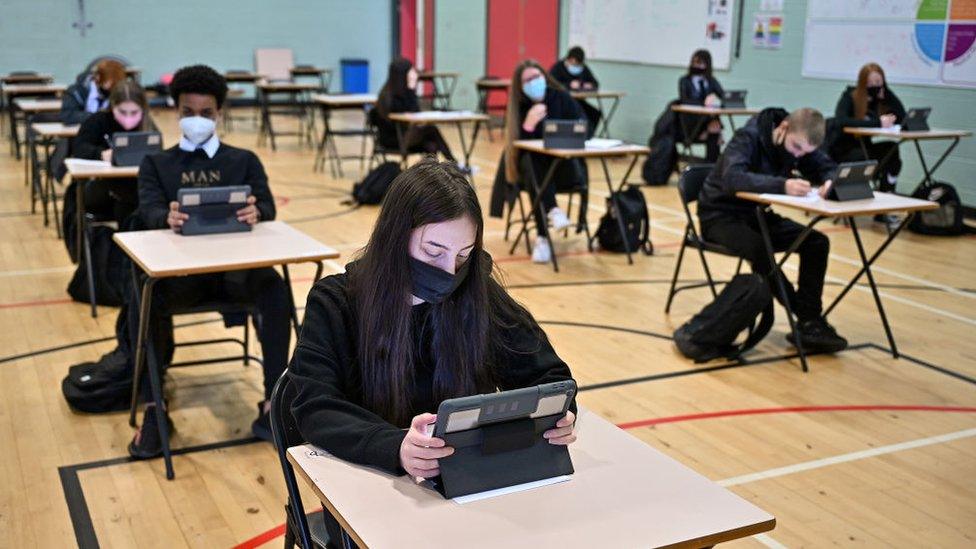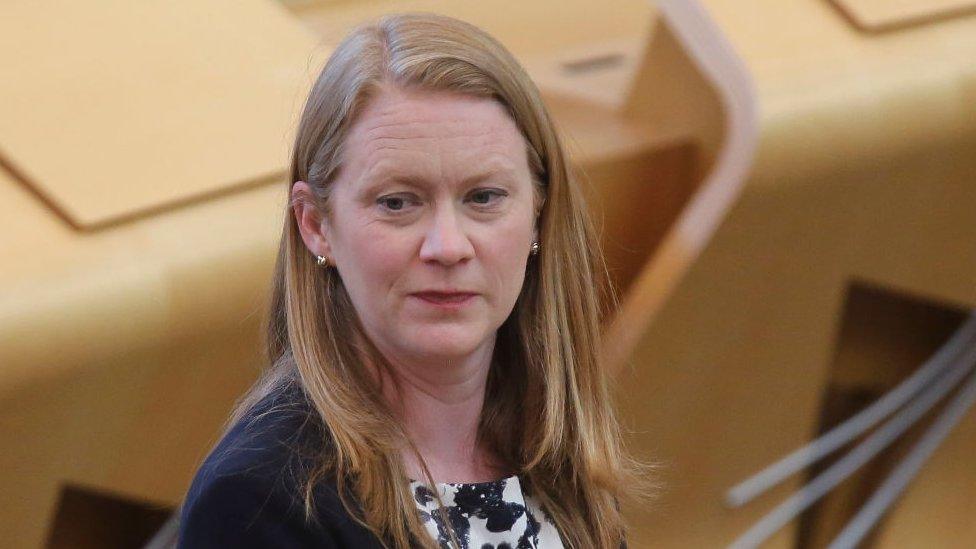Scrapping the SQA 'won't happen overnight'
- Published

Exams in Scottish schools have been cancelled for the past two years because of Covid
It could be some time before Scotland's exams body is scrapped, the country's education secretary has said.
Shirley-Anne Somerville said replacing the SQA with a new agency that will deal with the curriculum as well as exams will not happen overnight.
She said the SQA would continue to deliver exams as it had done previous in years until the new organisation has been set up.
The Scottish government announced on Monday that it was replacing the SQA.
It came after a long-awaited independent report into the country's Curriculum for Excellence (CfE) was finally published.
The report by the OECD backed the curriculum as a whole, but said there was too much focus on exams in the later years of schooling.
It said this had led to a "misalignment" on the "visionary ideals" of the curriculum, which was supposed to be focused on producing more rounded individuals rather than teaching to tests.
Opposition parties - some of whom have been calling for some time for the SQA to be scrapped - said the report was a "damning judgement of Scotland's exams system".
The Scottish Qualifications Authority has also been at the centre of controversy over plans that were put in place to award qualifications to school pupils after exams were scrapped two years in a row because of the pandemic.
A decision is whether or not formal exams will be held next year is due to be made before schools return from the summer holiday in August.
The OECD report was handed to the Scottish government in February, but both Ms Somerville and First Minister Nicola Sturgeon said earlier this month that they continued to have full confidence in the SQA.
They said on 4 June that the exams body would be reformed - before announcing shortly after the report was published on Monday that it would be scrapped altogether.
Schools agency Education Scotland is also to be shaken up, with responsibility for school inspections to be split off to a new independent system.

Shirley-Anne Somerville said earlier this month that she had full confidence in the SQA
Speaking to the BBC's Good Morning Scotland programme, Ms Somerville did not disagree when it was put to her that it could be several years before the SQA is actually replaced.
She said she wanted to ask stakeholders, particularly teachers and young people, whether they agreed with the OECD's recommendations.
She added: "Then we can take that forward, so that will take time, and it will perhaps need to go to parliament for some legislation.
"So this isn't going to be an overnight change, and that it is exceptionally important to stress that the SQA a will continue to do their job, continue to deliver sound qualifications, just as they have done for many a year.
"We will continue to do that until we have a new body in place."
She insisted that the current system was "fair and credible" and that she has faith in the ability of the SQA to deliver.
But she said the OECD had proposed setting up a "different type of agency that will bring together both curriculum and assessment, which is different to what it is just now".
Ms Somerville also said she was "very open" to discussion on whether changes could be made to the assessment system that would "better allow our young people to demonstrate their abilities".

Pupils protested last year over the SQA's method of deciding what grades they should be awarded after exams were cancelled
There has been speculation that traditional exams could be scrapped altogether and replaced by a system of continuous assessment instead - with the EIS teaching union among those to have called for the move.
Ms Somerville said she would not say much more about any possible changes until after the OECD published a report in August that will specifically look at the exams system.
But she added: "It is not unusual for the different types of assessments to change over time.
"What is absolutely critical is all the way through that - whether it is the qualifications we sat or the qualifications young people are sitting today or into the future - they're sound, they're credible and young people can have faith in them as they move onto other different types of education or employment".
What is the Curriculum for Excellence?
The CfE was developed in the early 2000s and adopted across Scotland's schools from 2010/11.
In broad terms, it was a shift in focus away from the acquisition of knowledge for its own sake, with a greater emphasis being placed on how to use or apply knowledge.
Its aim was to give pupils a "holistic understanding" that equipped them to be successful learners, confident individuals, responsible citizens, and effective contributors.
What did the OECD report say about it?
The OECD, an international organisation that works to build better policies, said Scotland was among the first education systems to embrace the 21st Century learning movement.
The report said the CfE offered "an inspiring and widely supported philosophy of education".
However, it said adjustments might be needed in secondary school where the exams system was a significant barrier to its implementation.
The OECD said teaching methods became more "traditional" for pupils in secondary school, especially the senior phase, in order for them to pass exams.
Senior phase students reported an emphasis on rote learning and memorisation, which they described as "boring".
The report said Scotland could identify ways of assessing pupils that could be used in senior phase, such as continuous assessment, which would be better suited to the aims of the CfE.
- Published21 June 2021

- Published24 May 2021
